A Brief History of the Handel Society
adapted from the Foreword to Heywood Alexander’s
“The Handel Society 1807-2000”
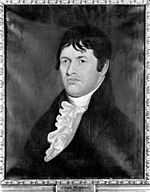
John Hubbard, founder of the Handel Society.
(Courtesy Dartmouth College Library)
The Handel Society was founded in 1807 to fulfill a need on the small, rural campus of Dartmouth in the outpost of what was then Hanover for the study and performance of sacred music. Its leader, John Hubbard, Professor of Mathematics and Philosophy, advocated musical reform in church music and the development of musical taste in America as he saw it, espousing the work of worthy European composers while denigrating the “unworthy” compositional efforts of early Americans. The Society exercised leadership in forwarding these aims—no matter that those European composers were all English or had strong English connections and were not necessarily of the first rank. Hubbard created the ensemble to “promote the cause of true and genuine sacred music” such as that of Baroque masters. Members of the Society believed the musical works of George Frederic Handel best exemplified their values and consequently adopted his name for the ensemble.
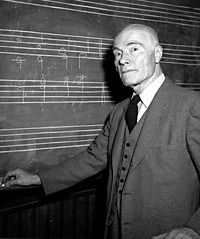
Maurice Longhurst conducted the Handel Society in the 1930s and earlier, when it was also known as the Community Chorus.
(Courtesy Dartmouth College Library)
Originally a small and primarily male organization, the Dartmouth Handel Society soon began to include “honorary” members from the community as well as instrumentalists. Thus began its town/gown history and the instrumental music associated with what was primarily a choral group.
In mid-century, during a period of decreased religious zeal, the activities of the Society faltered, and by the 1890s it ceased to exist. Its name was picked up again immediately following World War I and applied to a loosely coordinated tradition of not only choral music but orchestral music as well, both under the leadership of conductor Maurice Longhurst. The orchestral tradition of the Handel Society Orchestra continued until the formation of the Hopkins Center in the 1960s, when the orchestra became the Dartmouth Symphony Orchestra, a still active organization.
From the 1920s the story of the Handel Society reveals a rather different sort of musical organization.
The music presented during the decade of the 1930s was that of the operetta, works by Gilbert and Sullivan, as well as by Reginald De Koven, Victor Herbert and others. This was a tradition close to the heart of Maurice Longhurst, who had become acquainted previously with Gilbert and Sullivan operettas while teaching in Scotland.
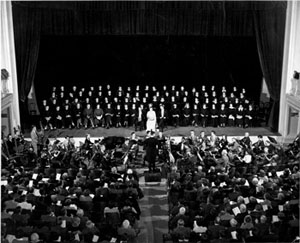
The Handel Society on stage in Webster Hall, 1947, with Arnold Kvam conducting The Messiah.
(Courtesy of his daughter, Ingrid Kvam)
Cellist Arnold Kvam, who became director of the Society in the 1940s, set the Handel Society on its present course of performing large choral/orchestral works. His vision and leadership established the Handel Society on a trajectory that continues into the twenty-first century.
Kvam’s successor, James Sykes, who conducted the Handel Society for twenty years to 1972, is somewhat harder to categorize. Sykes’ first love and primary expertise was the piano, which he played well in a variety of styles. Less adept as a choral conductor, he nevertheless led the Handel Society through an innovative and important repertory of choral music.
However, by the 1960s, things were not going well for the Handel Society. It did not play a part in opening events for the Hopkins Center in 1962, nor did it participate under its own name in subsequent events at the Center, nor in the prestigious Congregations of the Arts (1963–1969). When Sykes retired from its leadership in 1972 the Handel Society entered an unsettled period. During that time, the ensemble was conducted by three different musicians—Steven Ledbetter, Stephen Bolster, and Blanche Moyse. By the late 1970s the Handel Society had fallen into inactivity and virtually ceased to exist.
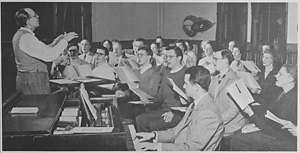
James Sykes and the Handel Society, c. 1960.
(Courtesy of Rauner Library)
At this juncture, in 1979, Melinda O’Neal appeared. She came to campus to interview for the position of choral conductor at the College and was told almost offhandedly about the former existence of the Handel Society and the efforts of some to seek a new conductor for the Society who would solidify its tradition and carry it to new musical accomplishment. Well prepared for the job, O’Neal seized the opportunity and led the Society with distinction until she stepped down in June, 2004. Her catalog of performances and her work with student conductors and the Concertato Singers, a smaller group she founded out of the Handel Society, show a record of remarkable accomplishment.
From the five original members, the Handel Society has grown over time to approximately 90 auditioned singers today. Encompassing Dartmouth students, faculty and staff as well as members from the Upper Valley community, the Handel Society serves both to encourage and promote young Dartmouth singers and to refine more experienced singers from the community, some of whom travel considerable distances to participate.
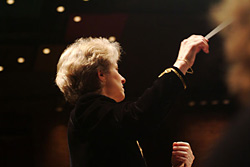
Melinda O’Neal conducting the Handel Society in 2003.
(Photo by Joe Mehling)
Today’s Handel Society performs a wide selection of choral-orchestral masterworks, both old and new, secular and sacred. In recent years, major works included Bach's Matthäus Passion, Messe in h-moll, Johannes Passion, and Weihnachts Oratorium; Verdi’s Requiem; Haydn’s Schöpfungsmesse and Theresienmesse; Brahms’s Ein Deutsches Requiem; Belioz’s L’Enfance du Christ and Roméo et Juliette; Mendelssohn’s Elijah; Händel’s Messiah; Arvo Pärt’s Te Deum; John Adams’s Harmonium; Franz Schubert’s Mass in E-flat Major, Vaughn Williams’s Dona Nobis Pacem and Bernstein’s Chichester Psalms.
Guest vocal soloists have included some of America’s most outstanding oratorio singers, such as Elizabeth Anker, Sharon Baker, Janet Brown, Kendra Colton, Pamela Dellal, David Arnold, Allan Bennett, William Hite, James Maddalena and Ryan Turner.
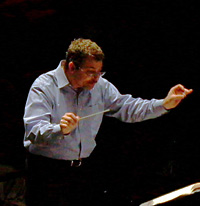
Conductor Bob Duff at a rehearsal in December 2005.
(Photo by Heywood Alexander)
The Handel Society’s director after Dr. O'Neal, Dr. Robert Duff, led the choir through its bicentennial celebration which included a tour to Austria, Switzerland and Italy, the commissioning and premiere of Fire and Ice by Andrea Clearfield, and a residency by Helmuth Rilling that culminated in two sold-out performances of Messiah.
